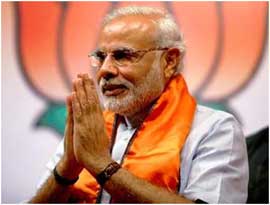Modi Cruises with Ease as Prime Minister of India for a Second Term
TORONTO, Jun 03 (IPS) - Siva Sivapragasam is Executive Editor, Toronto-based "Monsoon Journal"
The boy who sold tea at railway platforms for a living has become the Prime Minister of world's largest democracy for the second time. Narendra Dhamodaradas Modi, incumbent Prime Minister and leader of the BJP secured a second chance to be the Prime Minister at Indian elections which took place recently. The election was perhaps the largest held in any part of the world with 39 days of polling and involving as many as 900 million voters.

As the counting was nearing its end, it was crystal clear that Modi's BJP and its allies were heading for a landslide victory and expected to have a clear majority in the Lok Sabha
Modi expressed confidence that the BJP victory was the common man's victory. In his victory speech, he remarked that the win was "a guarantee of a bright future for the common people of this country. I want to bow my head before the 1.3 billion people of this country. This election was fought by the people. If anyone has won, it is India. We dedicate this victory to the people of India."
Economic issues such as unemployment, price rise, poverty, wages and salaries, GST and demonetization seem to have not mattered much to the voters during this election. Bread-and-butter concerns seem to have counted for less than they did a few months ago, with priorities shifting from specifics such as unemployment to ‘Vikas'.
Modi was raised in a small town in northern Gujarat, and he completed an M.A. degree in political science from Gujarat University in Ahmadabad. During his time as head of the Gujarat government, Modi established a formidable reputation as an able administrator, and he was given credit for the rapid growth of the state's economy.
The Congress party's rule before Modi took over in 2014 was looked upon as a decade of decay. Modi's criticism of the Congress rule was based on the corruption scandals, rise in prices, a weak foreign policy and family politics.
These allegations combined and contributed to the downfall of the Congress Party. It was Modi's mix of economic efficiency and hardline nationalism that mesmerized the voters in India in 2014 with a "Modi Wave" when they were looking for a change of leadership and Government.
Modi enjoyed massive support among India's middle classes and business community who credit him with turning Gujarat into an economic powerhouse.
In the recent elections too, Modi campaigned as a passionate Hindu placing security of India as a top priority. Modi spent Saturday night and Sunday morning, the last day of the election, praying at a Hindu shrine and meditating in a remote Himalayan cave.
Despite economic woes and unfulfilled economy reforms, Indians have assumed Modi is better equipped to fix these problems than any other available alternative. Thus, a vote to BJP became more of a vote to Modi. Mahatma Gandhi once remarked his reason for selecting Nehru as India's first Prime Minister – "India is safe in Nehru's hands". India in her millions have echoed in chorus, "India is safe in Modi's hands".
At the elections this time Modi styled himself as a ‘chowkidar' (or watchman) taking care of the country's interests Narendra Modi's Hindu nationalism, the security of India and the absence of a strong Opposition leadership coupled with a weakened Congress Party seem to have been the factors for the BJP victory.
The Opposition's efforts to pin down the government on issues like demonetization, GST or the Rafale purchase seemed to have made no impression on the electorate, which backed his second-term campaign.
The voters were determined to support a party that would offer stability to the country and placed their faith in a strong leader like Modi. It is to the credit of Modi that he ended the Nehru-Gandhi dynasty politics to get the country's top political job.
Although the BJP was able to obtain a landslide win in Northern India the party could not score enough seats in the Southern states where the Congress and regional parties beat the BJP. The Congress-led UDF notched up impressive numbers at the expense of the Left in Kerala, winning 19 of the 20 seats, while the DMK-led coalition demolished the AIADMK-BJP alliance in Tamil Nadu, winning 37 out of 39.
The Modi mantra for the elections was based on unity, integrity and security of India and these slogans paid him considerable dividends in the elections. He re-echoed this chorus at the oath taking ceremony when he remarked "Our Government will leave no stone unturned to safeguard India's unity and integrity. National security is our priority."
There is no doubt that these slogans will continue to be used by Modi to maintain the popularity of his government in the future. The election victory indicates that Modi's political leadership has been accepted by the people of India.
"One thing we know for sure is that Modi remains incredibly popular despite everything that's happened in the last five years," says Milan Vaishnav, a South Asia expert at the Carnegie Endowment for International Peace.
© Inter Press Service (2019) — All Rights ReservedOriginal source: Inter Press Service
 Global Issues
Global Issues